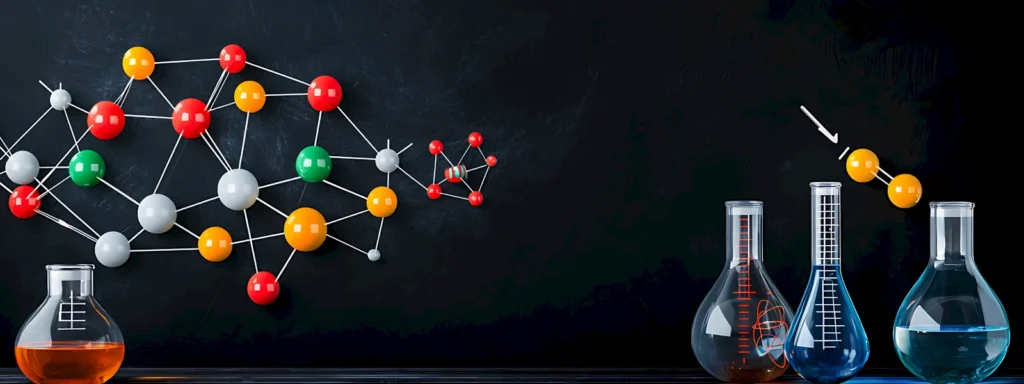Chemistry: The Science of Understanding the Secrets of Nature
Chemistry is known as the “central science” because it links physics and biology, connecting the physical and living worlds. It is the study of matter, its properties, how and why substances combine or separate to form other substances, and how these substances interact with energy. From the air we breathe to the food we eat, chemistry is an integral part of our daily lives. It helps us understand the world at a molecular level and provides solutions to some of the most pressing challenges facing humanity today.
What is Chemistry?
Chemistry is the scientific discipline that deals with the composition, structure, properties, and changes of matter. It involves studying atoms, molecules, and ions, and how they interact with one another. The word “chemistry” itself is derived from the Arabic word al-kīmiyā, which refers to the transformation of matter.
At its core, chemistry seeks to answer fundamental questions:
- What are things made of?
- How do substances change?
- Why do certain reactions occur while others do not?
By answering these questions, chemists can create new materials, develop life-saving drugs, and even explore the mysteries of the universe.

Branches of Chemistry
Chemistry is a vast field, and it is divided into several branches, each focusing on different aspects of matter and its interactions.
- Organic Chemistry:
Organic chemistry is the study of carbon-containing compounds, which are the building blocks of life. Carbon has a unique ability to form stable bonds with other elements, leading to the creation of a vast array of organic molecules. This branch of chemistry is essential for understanding the structure and function of biomolecules like proteins, DNA, and carbohydrates. It also plays a crucial role in the development of pharmaceuticals, plastics, and fuels. - Inorganic Chemistry:
Inorganic chemistry focuses on the study of inorganic compounds, which include minerals, metals, and non-metals. This branch explores the behavior and properties of materials like salts, acids, and bases. Inorganic chemistry is vital for industries such as electronics, ceramics, and catalysis. - Physical Chemistry:
Physical chemistry combines principles of physics and chemistry to understand the physical properties and behavior of matter. It deals with concepts like thermodynamics, kinetics, and quantum mechanics. Physical chemists study how energy interacts with matter and how chemical reactions occur at the molecular level. - Analytical Chemistry:
Analytical chemistry involves the analysis of substances to determine their composition and structure. It uses techniques like spectroscopy, chromatography, and mass spectrometry to identify and quantify chemical components. This branch is essential in fields like environmental science, forensics, and quality control. - Biochemistry:
Biochemistry focuses on the chemical processes that occur within living organisms. It explores how biological molecules like enzymes, hormones, and DNA function and interact. Biochemistry is crucial for understanding diseases, developing treatments, and advancing biotechnology.
Importance of Chemistry in Everyday Life
Chemistry is not just confined to laboratories; it is all around us. Here are some ways chemistry impacts our daily lives:
- Food and Nutrition:
Chemistry plays a vital role in food production, preservation, and safety. Processes like fermentation, pasteurization, and refrigeration rely on chemical principles. Additionally, chemistry helps in the development of fertilizers and pesticides, which increase agricultural productivity. - Medicine and Healthcare:
The development of drugs and vaccines is rooted in chemistry. Chemists design and synthesize new compounds to treat diseases, and analytical chemistry ensures the quality and safety of medications. Biochemistry, in particular, helps us understand the molecular basis of diseases like cancer and diabetes. - Energy and Environment:
Chemistry is at the forefront of developing sustainable energy solutions. From solar panels to batteries, chemical reactions are harnessed to generate and store energy. Green chemistry focuses on reducing waste and minimizing the environmental impact of chemical processes. - Materials and Technology:
Chemistry has revolutionized the materials we use in everyday life. Plastics, polymers, and composites are all products of chemical research. Advances in nanotechnology and materials science have led to the development of stronger, lighter, and more durable materials. - Household Products:
From cleaning agents to cosmetics, chemistry is behind many household products. Detergents, soaps, and disinfectants are all formulated using chemical principles.
Chemistry in Industry
Chemistry is the backbone of many industries, including:
- Pharmaceutical Industry:
The pharmaceutical industry relies heavily on chemistry to discover, develop, and manufacture drugs. Medicinal chemists design new compounds, while analytical chemists ensure their safety and efficacy. - Agriculture:
Chemistry has transformed agriculture through the development of fertilizers, pesticides, and herbicides. These chemicals increase crop yields and protect plants from pests and diseases. - Petrochemical Industry:
The petrochemical industry produces fuels, plastics, and synthetic materials from petroleum. Chemistry is essential for refining crude oil and converting it into useful products. - Environmental Science:
Chemistry helps address environmental challenges like pollution, climate change, and waste management. Chemists develop technologies to clean up oil spills, reduce greenhouse gas emissions, and recycle materials.

The Future of Chemistry
The future of chemistry is filled with exciting possibilities. Here are some areas where chemistry is expected to make significant contributions:
- Green Chemistry:
Green chemistry aims to design chemical processes and products that are environmentally friendly. It focuses on reducing waste, using renewable resources, and minimizing the use of hazardous substances. - Nanotechnology:
Nanotechnology involves manipulating matter at the atomic and molecular scale. It has applications in medicine, electronics, and materials science. For example, nanoparticles can be used to deliver drugs directly to cancer cells. - Renewable Energy:
Chemistry is key to developing renewable energy sources like solar, wind, and hydrogen fuel cells. Researchers are working on improving the efficiency of solar panels and developing better energy storage systems. - Artificial Intelligence in Chemistry:
AI is being used to accelerate chemical research. Machine learning algorithms can predict the properties of new compounds and optimize chemical reactions, saving time and resources. - Space Exploration:
Chemistry is essential for space exploration. It helps in developing life-support systems, rocket fuels, and materials that can withstand extreme conditions in space.
Conclusion
Chemistry is a fascinating and dynamic field that touches every aspect of our lives. It helps us understand the world at a fundamental level and provides solutions to some of the most pressing challenges facing humanity. From developing life-saving drugs to creating sustainable energy solutions, chemistry has the power to transform our world for the better.
As we continue to explore the mysteries of the universe, chemistry will remain at the forefront of scientific discovery. Whether you are a student, a researcher, or simply someone curious about the world around you, chemistry offers endless opportunities to learn, innovate, and make a difference. So, the next time you look at the stars, cook a meal, or take a breath, remember that chemistry is at work, shaping the world in ways both big and small.


